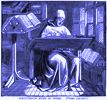 In part one of this series, I discussed the pros and cons of insisting on killer opening lines, how it serves the interests of agents and editors more than readers, yet how a strong first line can still lend an air of dignity and confidence to any story. In part two, I presented my favorite first lines based on engaging ideas, and in part three, dived into engaging characters.
In part one of this series, I discussed the pros and cons of insisting on killer opening lines, how it serves the interests of agents and editors more than readers, yet how a strong first line can still lend an air of dignity and confidence to any story. In part two, I presented my favorite first lines based on engaging ideas, and in part three, dived into engaging characters.
Today I want to dig into my third list of Best First Lines, six of them, dedicated to openers that present the reader with an engaging setting.
Now, you might assume that setting is distinct from the characters in it, but several of the lines in my list below show how characters — reduced to their most basic, introductory aspect — can strongly bring out the flavor of a setting.
Engaging setting
“The sky above the port was the color of television, tuned to a dead channel.” – Neuromancer by William Gibson
Not only is this description evocative and immediately accessible to a modern readership, but the technological imagery neatly invokes the cyberpunk theme of this seminal novel. Also, the loaded modifier “dead” puts a nice punch at the end, and nicely invokes the title’s play on words.
÷∞÷
“In a hole in the ground there lived a hobbit. Not a nasty, dirty, wet hole, filled with the ends of worms and an oozy smell, nor yet a dry, bare, sandy hole with nothing in it to sit down on or to eat: it was a hobbit-hole, and that means comfort.” – The Hobbit by J. R. R. Tolkien.
The elegance of Tolkien’s prose here is matched only by the clever way he introduces an exotic race using very familiar imagery: leading us away from our uncomfortable expectations of what it might be like to live in a hole, toward “comfort” by implying tables and chairs without actually mentioning them. And, the fact that we’re reading a story about a “hobbit”? From the very start, we know that we’re starting a journey of speculative fiction.
÷∞÷
“He was an old man who fished alone in a skiff in the Gulf Stream and he had gone eighty-four days now without taking a fish.” – The Old Man and the Sea by Ernest Hemingway
Hemingway does some intriguingly indirect tricks with time and space here, using very simple words. The vastness of the sea, rather than being explicitly stated, is invoked by contrast with the old man’s solitude and the small type of craft he uses, and the specificity of the number of fishless days tells us that the old man had been keeping count. For a long, long time.
÷∞÷
“A Saturday afternoon in November was approaching the time of twilight, and the vast tract of unenclosed wild known as Egdon Heath embrowned itself moment by moment.” The Return of The Native by Thomas Hardy,
I like this opener not least of which because it was so expertly lampooned by Monty Python. But, even without this comedic tribute, Hardy’s opener has a relaxed pace that perfectly matches the late afternoon it describes. Note also the reflexive verb construction: the agent of this sentence is the setting itself.
÷∞÷
“Mars was empty before we came.” – Red Mars by Kim Stanley Robinson
With this simple statement, Robinson opens a sweepingly epic sci-fi trilogy that presents a Mars that is anything but empty, and hints at one of the sticking points in the ideological wars that later rock the red planet.
÷∞÷
“The man in black fled across the desert, and the gunslinger followed.” The Dark Tower : The Gunslinger by Stephen King.
Antagonist, action, locale, protagonist, reaction: five key story elements established here in twelve words. Now that’s some efficient, effective writing!
